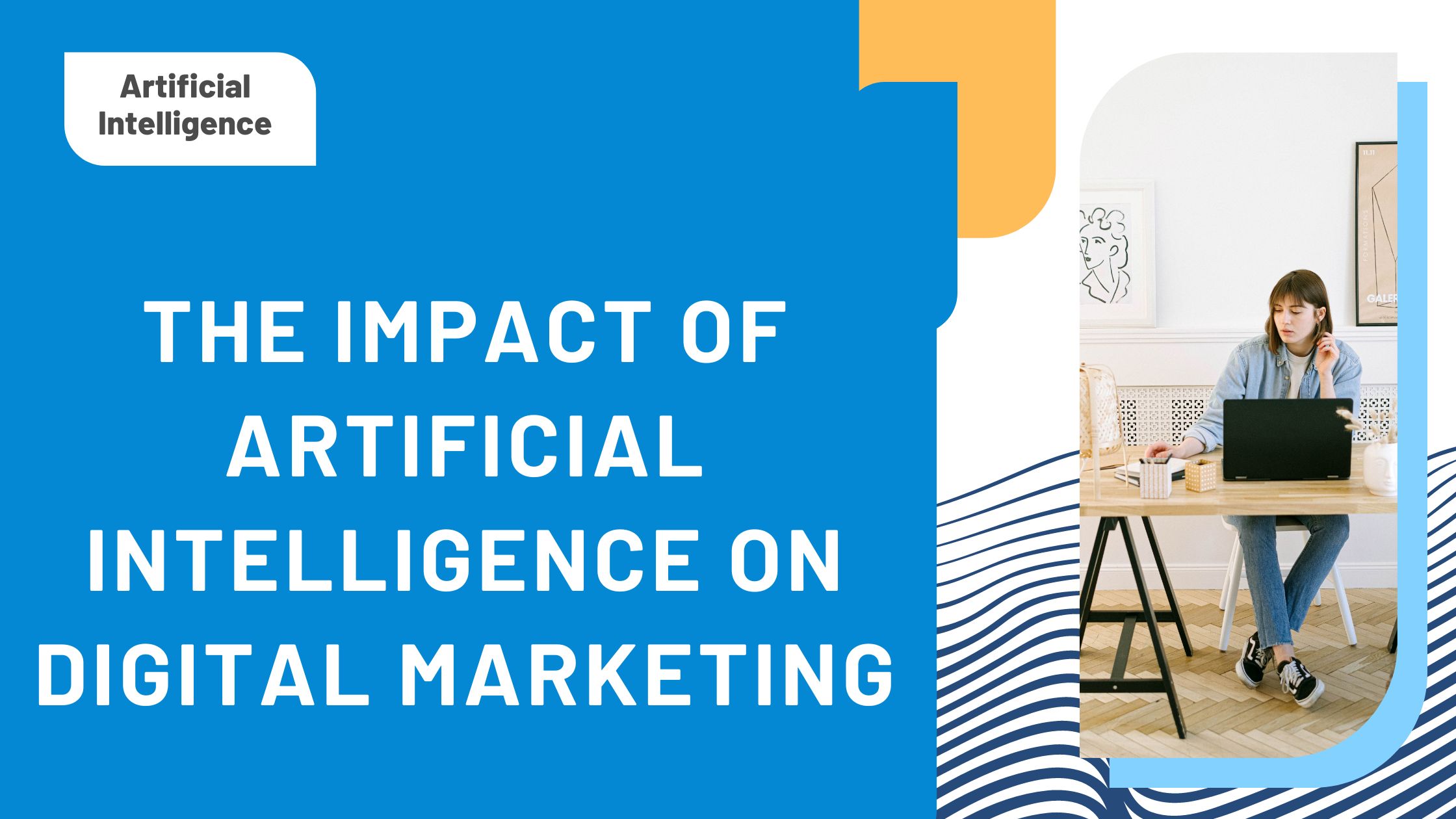Artificial Intelligence (AI) has revolutionized many industries, and digital marketing is no exception. With the ability to analyze large amounts of data. AI algorithms can help businesses make more informed decisions and target their marketing efforts more effectively. In this blog post, we’ll explore some of how AI is impacting digital marketing. And how businesses can take advantage of these advancements.
- Personalized marketing
One of the most significant ways in which AI is impacting digital marketing is through personalized marketing. With the help of AI algorithms, businesses can now gather data on individual customers. That information to create customized marketing campaigns that are tailored to their specific needs and interests.
7 Applications of Artificial Intelligence in Business
For example, imagine that a customer visits an e-commerce website and browses a specific category of products. An AI algorithm can track the customer’s behaviour and use that information to create personalized product recommendations for them. Additionally, the algorithm can also send personalized email campaigns and ads that are relevant to the customer’s browsing history.
- Predictive analytics
Another way in which AI is impacting digital marketing is through predictive analytics. Predictive analytics is the process of using historical data and machine learning algorithms to predict future events. This technology can help businesses make more informed decisions by providing insights into customer behaviour and market trends.
For example, imagine that a business wants to know which products are most likely to sell well in the next quarter. An AI algorithm can analyze data on past sales and use that information to predict which products are most likely to be successful in the future. This can help the business make more informed decisions about which products to stock and how to price them.
- Chatbots
Chatbots are another area where AI is having a significant impact on digital marketing. Chatbots are computer programs that are designed to simulate human conversation. They can be used to provide customer service, answer questions, and even make recommendations.
How To Use AI For Business Growth
For example, imagine that a customer visits a business’s website and has a question about a product. Instead of having to navigate through a complicated menu or wait on hold for a customer service representative. The customer can simply type their question into a chatbot. The chatbot will then use natural language processing (NLP) to understand the question and provide a relevant response.
- Optimizing Ad Campaigns
AI can help optimize ad campaigns by identifying patterns and trends in data. Which can help businesses make more informed decisions about where to allocate their ad budget. For example, imagine that a business is running a social media ad campaign. An AI algorithm can analyze data on the campaign’s performance. Use that information to identify which demographics are most likely to respond to the ad.
This information can then be used to optimize the campaign by targeting ads to specific demographics. Adjusting the ad’s creative elements to better appeal to those demographics. Additionally, AI can also be used to optimize the timing and placement of ads. Which can help businesses get the most out of their ad budget.
- Enhancing Email Marketing
AI can also be used to enhance email marketing. For example, an AI algorithm can analyze data on customer behaviour, including email open and click-through rates. To determine which types of emails are most likely to be successful. This information can then be used to create more effective email campaigns that are better able to convert leads into customers.
In addition, AI can also be used to optimize the timing of emails. For example, an AI algorithm can analyze data on when customers are most likely to open and respond to emails and use that information to schedule emails to be sent at the most optimal times.
How will artificial intelligence impact marketing in the future?
Artificial Intelligence (AI) is expected to have a significant impact on marketing in the future. Here are a few ways in which AI is likely to shape the industry:
- Personalization: AI-powered personalization is already being used to create customized marketing campaigns and product recommendations for individual customers. As technology continues to advance, we can expect even more sophisticated personalized marketing efforts that are tailored to individual customer needs and preferences.
- Predictive analytics: AI-powered predictive analytics will become increasingly important in helping businesses make more informed decisions about products, pricing, and marketing strategies. As more and more data becomes available, AI algorithms will be able to analyze that data and provide valuable insights into customer behaviour and market trends.
- Automation: AI will play an increasingly important role in automating various marketing tasks. For example, AI-powered chatbots can be used to handle customer service inquiries, and AI algorithms can be used to optimize ad campaigns and schedule email marketing. This automation will free up marketers’ time to focus on more high-level, strategic tasks.
Recommended: The importance of developing social media branding
- Content creation: AI-powered content generation will become increasingly prevalent in the future. AI algorithms can be used to create personalized content and product recommendations, as well as optimize the timing and placement of that content. Additionally, AI can be used to create more effective, high-quality video and audio content.
- Real-time marketing: AI will also play a key role in real-time marketing. With the ability to analyze data in real-time, AI algorithms can help businesses identify and capitalize on current market trends, as well as respond quickly to changes in customer behaviour.
- Decision-making: As AI becomes more advanced, it will play an increasingly important role in decision-making. AI algorithms can analyze large amounts of data and provide valuable insights into customer behaviour and market trends. This will help businesses make more informed decisions about products, pricing, and marketing strategies.
- Ethical considerations: As AI becomes more prevalent in marketing, it’s important to consider the ethical implications of its use. Businesses need to ensure that their use of AI is respectful of customers’ privacy and rights and that they are transparent about how they use customer data.
Overall, AI is expected to have a major impact on marketing in the future. By automating various tasks, providing valuable insights, and creating personalized content, AI will help businesses target their marketing efforts more effectively and make more informed decisions. However, it’s important to consider the ethical implications of using AI and to use it in a way that aligns with business goals and respects customer privacy.
What are the biggest challenges to AI marketing success?
There are several challenges to achieving success with artificial intelligence in marketing, including:
- Data quality: AI-powered marketing relies heavily on data, and if the data is of poor quality or incomplete, the results will be unreliable. Businesses need to ensure that their data is accurate, relevant, and up-to-date to achieve the best results with AI.
- Technical expertise: Implementing and using AI in marketing requires a certain level of technical expertise. Businesses need to have the right personnel with the necessary skills and knowledge to effectively use the technology.
- Ethical considerations: As AI becomes more prevalent in marketing, it’s important to consider the ethical implications of its use. Businesses need to ensure that their use of AI is respectful of customers’ privacy and rights and that they are transparent about how they use customer data.
- Integration with other systems: AI systems need to be integrated with other systems within a company, such as the CRM, website, and e-commerce platforms. This integration can be complex and requires a lot of planning and testing to ensure smooth operation.
- Scalability: AI systems can be complex and require a significant amount of computing power. As a business grows, the AI system will have to scale to meet the increased demand. Failure to do so can lead to the system becoming slow, unresponsive, or even crashing.
Also Read This: How to use data and analytics to improve your marketing strategy
- Human oversight: AI systems can be very powerful, but they are not infallible. They can make mistakes or produce biased results, so it’s important to have human oversight to ensure that the output is accurate and unbiased.
- ROI: One of the biggest challenges for businesses is to quantify the return on investment (ROI) for AI initiatives. This can be difficult to measure, and businesses need to set clear goals and metrics to track progress.
In summary, achieving success with AI in marketing requires a combination of technical expertise, data quality, ethical considerations, integration with other systems, scalability, human oversight and clear ROI. Businesses that can successfully navigate these challenges will be well-positioned to take advantage of the many benefits that AI has to offer.
Conclusion
In conclusion, AI is having a major impact on digital marketing. With
the ability to analyze large amounts of data and create personalized marketing campaigns, businesses can now target their marketing efforts more effectively and make more informed decisions. Additionally, chatbots, predictive analytics, and ad campaign optimization can enhance the customer experience and increase conversion rates.
However, it’s important to note that AI is not a magic solution for all digital marketing challenges. It’s important for businesses to have a clear understanding of their goals, audience and how AI can be best used to achieve them. Additionally, as with any technology, businesses need to be aware of the potential risks and ethical considerations associated with using AI.
Overall, artificial intelligence is an invaluable tool for digital marketers, but it’s important to use it in a way that aligns with your business goals. With this in mind, businesses can harness the power of AI to create more effective marketing campaigns and improve their bottom line.





